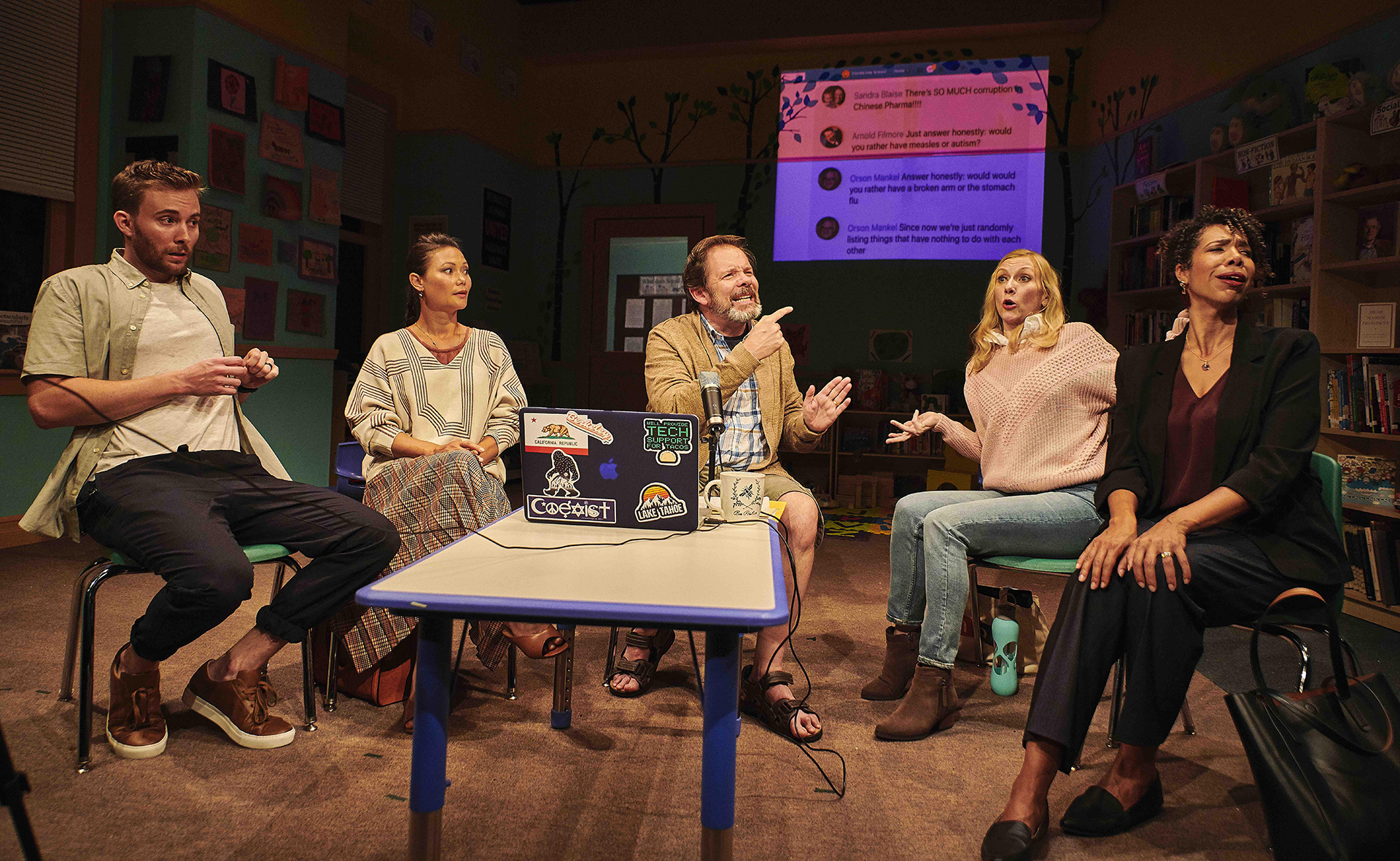Satire Explores Anti-Vaccine Movement

A horrible comedy, or rather a comedy that runs amok with horrible behaviors, “Eureka Day,” Colt Coeur’s new production at the Walkerspace Theatre in downtown Manhattan, is a laugh riot.
Set in an elementary school library at the titular Eureka Day School, in Berkley, CA, Jonathan Spector’s satire explores the excessively PC behavior of the tongue-wagging liberal parents who serve on the school’s board. In spite of the fact that they’re all pretty similar, they’re challenged when it comes to forging simple agreements.
The conversation is friendly at first, but when a mumps outbreak threatens the well-being of every child in school, the conflict between individual good versus the good of the group becomes a culture war beyond all culture wars.
To deal with the problem, school director, Don, initiates a “community-activated conversation” with parents, on the school’s Facebook page. The agitating sounds of digital notifications (thanks to sound designer Amy Altadonna) — ka-plop, ping, zing, ka-ping — explode in our ears, accompanying their commentary. The onstage conversation from the board gets dwarfed by the social media noise — the lurid posts from concerned parents.
Finally, one parent writes, “We have a winner. First Nazi reference.” And it’s not the last. As a metaphor of course, that is insanely over the top. Still, it highlights a community’s fear of being overrun by the belief systems of others.
A new voice in New York theater, Spector has crafted a play that digs into the zeitgeist of hostility and trolling in a wickedly funny way. Specifically, of course, this story draws on the national panic over the recent measles outbreak. The anti-vaccine movement, prompted by a medical journal suggesting that vaccines could cause autism, spurred an epidemic of fear.
People with faith-based objections, along with others inspired to create all-natural lives for their children, clung to this movement, even when the autism connection proved fraudulent and was retracted. But the issue, precisely because it does not parallel party politics, allows the audience to delve into the nature of dialogue, and consensus versus discord.
Indeed, the story turns deadly serious when one board member’s child becomes seriously ill with the virus. Finally, the characters we meet as stereotypes in the first act become somewhat more complex as we hear about their personal experience and motivation.
Brian Wiles’s Eli, an overly loquacious and privileged white man who believes in an open marriage, and every other conceivable notion of free expression, becomes a far subtler adult by the end of the play. And K.K. Moggie as the single mother with an unvaccinated child chooses more socially condonable behaviors by the play’s end.
As portrayed by Kate Cullen Roberts, Suzanne, a white-bread Midwesterner with several children in the school, wins our empathy in spite of her unpolitic views. In contrast, Elizabeth Carter as Corina, an African American lesbian, and the newest member of the board, integrates rather quickly, and rightfully so.
Well-known to New York audiences, Thomas Jay Ryan portrays Don, the sweetly benign school director who reads Rumi’s mystical poetry at board meetings, but plays dodge ball when it comes to making decisions.
John McDermott’s set of tiny colorful kindergarten chairs, book shelves, and drawings, is highlighted by a poster that reads, “What does social justice mean to me?” And Adrienne Campbell-Holt’s direction turns this frenetic comedy into human drama with deft sleight of hand.
‘American Moor’
An actor of imposing presence, Keith Hamilton Cobb is also the scribe of “American Moor,” currently at The Cherry Lane Theatre. This is a highly confrontational piece about race and racism in America. And Cobb directs his message, quite pointedly, to us.
“An American black man burns a whole lotta calories trying to keep a rein on full half of himself just so people around him don’t get nervous. I’m done,” he declares, following with, “Did I ever tell you how much I suck at basketball?”
As the title suggests, the play is about performing the role of Othello — beyond the stereotypes of Othello. Cobb’s affinity for Shakespeare, he explains, stems from how adamant the Bard’s characters are. That makes them great turf for this black man whose “depthless reservoir of emotion” is unleashed by their beautiful words.
While as an actor, Cobb is best known for his numerous roles on television (“The Young and The Restless,” and “Noah’s Arc”), his authority as a Shakespearean actor is powerful. Here he speaks to us in a variety of voices — his own, with inflections of street talk, and his own as an adult, an actor, and a classically trained performer.
As a vehicle Cobb wrote for himself, the piece is well textured, and reveals the actor’s emotional life in contextually subtle ways. The plot, what there is of one, centers around an audition for a white director, played by Josh Tyson, who is seated among us in the audience. As he insists on telling Cobb how to play Othello, the actor holds firmly to his inner life. We hear his inner thoughts, until he can no longer hold back. At that point, he speaks boldly, beseeching the director to hear it truthfully through this black actor’s eyes.
Whether or not he wins the role is up to the audience, in a certain sense. If he wins our empathy, which is his mission, he has more than won the role. He’s paved the way for conversations between people — people who can achieve the compassion to experience a shared humanity.
Interestingly, the piece is unapologetically directed by a white woman, Kim Weild. In Wilson Chin’s set design, a toppled classical column, a statue of a winged lion, and theatrical equipment are tossed upon a wooden O. And Dede Ayite’s costuming allows Cobb the freedom to play himself as a youth in black high tops, while a dark fitted shirt and khakis give him a militaristic look.



